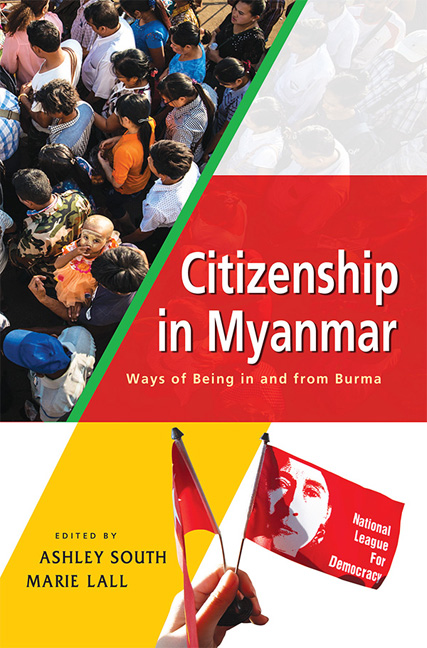Book contents
- Frontmatter
- Dedication
- Contents
- Foreword
- The Contributors
- Map of Myanmar
- Introduction
- 1 Ethnic Politics and Citizenship in History
- 2 Representation and Citizenship in the Future Integration of Ethnic Armed Actors in Myanmar/Burma
- Special Contribution: The Way Forward for Peace, Stability and Progress in Burma/Myanmar
- 3 National Political Dialogue and Practices of Citizenship in Myanmar
- 4 Citizenship and Minority Rights: The Role of “National Race Affairs” Ministers in Myanmar's 2008 Constitution
- Special Contribution: Karenni People at a Glance
- 5 Myanmar's Youth and the Question of Citizenship
- Special Contribution: I Am a Citizen of Myanmar
- 6 “The Value of Life”: Citizenship, Entitlement and Moral Legibility in Provincial Myanmar
- Special Contribution: How I Became Shan
- 7 Conflict and Mass Violence in Arakan (Rakine State): The 1942 Events and Political Identity Formation
- 8 Exploring the Issue of Citizenship in Rakhine State
- Special Contribution: Rohingya and Nationality Status in Myanmar
- 9 Myanmar's Other Muslims: The Case of the Kaman
- Special Contribution: Interview with P'doh Kweh Htoo Win
- Index
5 - Myanmar's Youth and the Question of Citizenship
Published online by Cambridge University Press: 28 June 2018
- Frontmatter
- Dedication
- Contents
- Foreword
- The Contributors
- Map of Myanmar
- Introduction
- 1 Ethnic Politics and Citizenship in History
- 2 Representation and Citizenship in the Future Integration of Ethnic Armed Actors in Myanmar/Burma
- Special Contribution: The Way Forward for Peace, Stability and Progress in Burma/Myanmar
- 3 National Political Dialogue and Practices of Citizenship in Myanmar
- 4 Citizenship and Minority Rights: The Role of “National Race Affairs” Ministers in Myanmar's 2008 Constitution
- Special Contribution: Karenni People at a Glance
- 5 Myanmar's Youth and the Question of Citizenship
- Special Contribution: I Am a Citizen of Myanmar
- 6 “The Value of Life”: Citizenship, Entitlement and Moral Legibility in Provincial Myanmar
- Special Contribution: How I Became Shan
- 7 Conflict and Mass Violence in Arakan (Rakine State): The 1942 Events and Political Identity Formation
- 8 Exploring the Issue of Citizenship in Rakhine State
- Special Contribution: Rohingya and Nationality Status in Myanmar
- 9 Myanmar's Other Muslims: The Case of the Kaman
- Special Contribution: Interview with P'doh Kweh Htoo Win
- Index
Summary
At its most basic the definition of citizenship is the rights and responsibilities that people have within a nation state. “Citizenship establishes the boundaries of the political community. It establishes that which is public and that which is private. It also tells us who is in and who is outside of the political community.” (Kivisto and Faist 2007, p. 13). Citizenship therefore denotes the membership to a polity — in this case a particular state and the membership involves a reciprocal set of rights and duties, sometimes described as a social contract. Generally politically motivated classes or elites decide who can access these rights, working in tandem with the state that has the monopoly on dictating who is in and out. As the introduction and other chapters discuss, there are other elements that are part of citizenship as well — they include identity, participation (see chapter by Walton in this volume) and an element of “moral citizenship” that includes working for the good of society that is expanded upon by McCarthy in Chapter 6. This chapter however focuses much on rights and responsibilities and how these relate to issues of belonging and identity.
Legal citizenship in Myanmar under military rule, as described in the Introduction, has always been defined from above. The 1982 Citizenship Act set out who was a Myanmar national, even if before the 2008 Constitution other rights and responsibilities were rather elusive. How the changes of citizenship were viewed by young people in light of political participation in the 2010 elections has been discussed elsewhere (Lall and Win 2013) This chapter seeks to elucidate views from below — specifically how young people across Myanmar define citizenship in light of the reforms and changes between 2011 and 2015. While few of the conclusions drawn from the survey would provide any great surprises, the aim of the chapter is to allow the voices of the young people who are experiencing the transition to express how they defined their relationship with the state and what underpinned their feelings of belonging in their own words. Beyond being legal citizens of the Myanmar state, how did they define their rights and responsibilities, how did this relate to their identity and what did they feel was important when defining citizenship as their country transitions from a military dictatorship to a more participatory system.
- Type
- Chapter
- Information
- Citizenship in MyanmarWays of Being in and from Burma, pp. 145 - 160Publisher: ISEAS–Yusof Ishak InstitutePrint publication year: 2017

